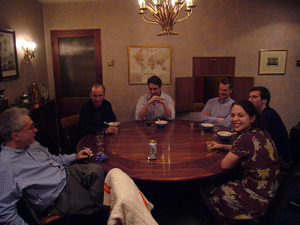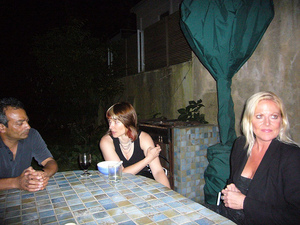We are developing the social individualist meta-context for the future. From the very serious to the extremely frivolous... lets see what is on the mind of the Samizdata people.
Samizdata, derived from Samizdat /n. - a system of clandestine publication of banned literature in the USSR [Russ.,= self-publishing house]
|
A few days ago, I was sifting through the intranet noticeboard of the large Australian bank I work for, and I stumbled on an organisation-wide message from our CEO. Anyone who has worked for a large multinational knows the breed – conversational in style, it is usually a somewhat ingenuous effort to create a collegial nexus between upper management and the ungrateful hoardes below. Amongst other rather tedious developments mentioned, the boss noted a recently deceased former customer of the bank who had, “in a rare display of loyalty and reciprocity”, left a substantial portion of his estate to the bank in return for a lifetime of what must have been absolutely brilliant service.
I was, however, disappointed to read that the bank would be donating the bequest to charities in the deceased’s region of abode. This will not do at all – the banks are going all wobbly-kneed and PC on us! What will the shareholders think? I would be tickled pink if our namby-pamby CEO cocked a snook at the “good corporate citizen” brigade and gratefully donated the entirety of the bequest straight to the bank’s bottom line. Better still if he sallied forth proudly stating “that money will be used to refurbish the executive bathroom for the third time this (financial) year.” Steve Edwards suggested he should blow the lot on a nice new tie. Anyone else have any ideas as to how the bequest might be spent? I am looking for the wildest corporate caricatures – the sort that would make Gordon Gekko blush. The funniest wins a degree of transient notoriety.
Today is a day of remembrance and a day to say “Thank you” to those who daily risk their lives for us. It is a day to ponder the guts and determination to save lives which drive fire and police men and women to risk – and sometimes lose – their lives so that others might live. It is a day to remember and thank our military men and women who have made our enemies reap what they have sown.
it is a day to be thankful of the courage which exists within the hearts of very average Americans, a strength of character that caused a small group to fight the first hand to hand battle of World War III in the skies over Pennsylvania.
Above all, it is a day to remember a horror perpetrated against us and to renew our vows to make our enemies pay and pay again for what they did.
There will be much media hype and spin today. Officials will say those sort of things which officials always must say. Personally I prefer the simple direct emotions of people much like myself who needed an outlet to express what they felt: Why We Fight and Have You Forgotten.
If you have not listened to these before (or have but not lately) I recommend you sit back and do so when you have a private moment and are free to shed a tear in remembrance.
Is this really the best way to combat negative stereotyping?
Britain could face the threat of two million home-grown Islamic terrorists, says a senior Muslim leader.
Muhammad Abdul Bari, the secretary-general of the Muslim Council of Britain, fears that continued negative attitudes towards people of his faith could provoke a vast and angry backlash.
“There are a few bad apples in the Muslim community who are doing terrible acts and we want to root them out,” Dr Bari told The Sunday Telegraph.
“But some police officers and sections of the media are demonising Muslims, treating them as if they’re all terrorists — and that encourages other people to do the same.
“If that demonisation continues, then Britain will have to deal with two million Muslim terrorists — 700,000 of them in London,” he said. “If you attack a whole community, it becomes despondent and aggressive.”
So, for those people who think that all Muslims are terrorists, Dr. Bari’s message is: you were right all along. You are not frothing, paranoid Islamophobic bigots but astute judges of character. And by the by, I don’t know what ‘media’ Dr. Bari has been exposed to but if it the same press that I have reading then I think he will find that, when it comes to terrorist atrocities, the members of the British Fourth Estate have been tripping over each other in the headlong dash to blame everyone and anyone except Muslims.
But, quibbles aside, I am inclined to be charitable and assume that Dr. Bari sincerely wishes to repair damaged community relations and foster a mutual spirit of tolerance. However, threatening what is tantamount to civil war is unlikely to achieve such a laudable objective.
Dr. Bari is described as a “senior Muslim leader” so I suppose that makes him a representative. I only hope that he is not representative.
Greer is disgusted by a vulgar fellow like Irwin, just as she has previously been disgusted by Australia’s vulgar choice of prime minister, its lack of culture, its shameful history and so much else Australian that doesn’t meet the standards of her refined intellect (how she must have agonized before accepting the invitation to appear on Celebrity Big Brother).
– Steve Waterson provides a most welcome addendum to Thaddeus’s slapping of fading English (!) intellectual Germaine Greer.
(Via Tim Blair)
This book states what the revisionists have questioned: the fall of the Roman Empire sucked and the Dark Ages really were dark and a regression for civilisation. Looks like a must-read for fans of ancient history.
The other day, my article about the antics of footballers and the shifting balance of power between players and clubs prompted one or two commenters to argue that this shows that market economics and sport do not always mix. The argument, so it goes, is that a sport like football or motor racing needs to operate an almost egalitarian policy when it comes to limiting the power of any participant, because otherwise the most powerful clubs and participants will dominate a sport so much that they destroy the very competition that makes sport enjoyable. Example: the current dominance in the English Premier League of Chelsea, which is now backed by the vast and dubiously-acquired oil wealth of its Russian owner. Another example: Ferrari and its dominance for nearly a decade of Formula One motor sport.
But while such observations have merit, it ignores the fact that sporting institutions like the Football League or Formula 1, the America’s Cup yachting race or whatever are voluntary associations of likeminded people who want to create a set of rules in order for people to have, well, fun. Those voluntary bodies can change their own rules if a participant’s behavioural dominance starts to squeeze the very competition such institutions hold. People effectively choose to submit to rules, just as members of a symphony orchestra voluntarily submit to the dictates of a conductor. In an open society such as ours, we get a profusion of autonomous institutions set up for the purpose of say, staging sports competitions where there are tight rules on behaviour of the participants but where such participants are free to leave.
I personally think that if, say, Chelsea tried to squash all competition beyond a certain point, it could drain interest out of the sport and possibly force the league officials to cap things like the use of foreign players and perhaps even limit the size of a squad that any club can have. And that would be “autocratic” of the league but also no assault on the “freedom” of Chelsea since that club draws is raison d’etre from being a club participating in an intensely rule-bound voluntary association.
Also, if a sport gets bent out of shape and the interest wanes, there are things like “breakaway leagues” or new competitions designed to revive interest. The case of motor sport is instructive: in the last few years, there has been a rising chorus of criticism that F1 motor racing is dull, unglamorous and market-driven (and although no-one will admit this, also very safe). So you get a rise in interest in alternatives, such as rallying, motorcycling, saloon car racing, classic racing, revival meetings, and so forth.
There seems to be a sort of parabola of development in sports. As technical excellence and physical fitness of players increases, some sports can reach a sort of stalemate end-point (Brian Micklethwait made this point about squash and the World Cup soccer tournament recently). But so long as sport remains outside the maw of the state and people can arrange their own events, there is no reason why people who become bored by the spectacle of spoiled-brat soccer stars or processional motor racing cannot do something about it.
Friday night saw yet another party at Samizdata HQ; it has indeed been a busy summer for such gatherings. This one was in honour of Tracy Sheridan, CEO of podcasting company Waxxi. I was fortunate to meet Tracy at the inaugural Techdirt Greenhouse event in Silicon Valley earlier this year, and since then have had the pleasure of her company twice more in the Bay Area. I promised her that if she came to town, we would throw her a party, and – what do you know? – she took me up on it. We are glad she did!
 Yes, it’s a living manga character/Samizdata editor.
Yes, it’s a living manga character/Samizdata editor.
 The Algonquin Roundtable crowd had nothing on this bunch.
The Algonquin Roundtable crowd had nothing on this bunch.
 Someone had just told me that Ken Livingstone was hanging from a light pole outside; seconds later, the truth emerged and my smile disappeared.
Someone had just told me that Ken Livingstone was hanging from a light pole outside; seconds later, the truth emerged and my smile disappeared.
 The Three Blogateers: JP Rangaswami, Adriana Lukas, and guest of honour Tracy Sheridan
The Three Blogateers: JP Rangaswami, Adriana Lukas, and guest of honour Tracy Sheridan
See more pictures of the festivities on Flickr.
Dutch-born writer Ian Buruma writes about the issues stemming from the murder of Dutch film-maker Theo Van Gogh. On the basis of his previous writings, I would have expected his account to be a compelling one. This reviewer of his book, however, gives a fairly harsh assessment. (Via Arts & Letters Daily).
Readers of Murder in Amsterdam are likely to close the book with a heavy heart. One reason is that the problem it addresses, the emergence of militant Islam as a divisive political/religious force in the West, is not going to go away soon. Another is that, though full of learning and skilled if tepid reporting, Buruma’s book often feels muddled, ungenerous and confusing. There is plenty of scholarship on display, but no compelling point of view.
There is, however, an off-putting strain of snobbery. Buruma, an Asia specialist and the author of Inventing Japan, Anglomania and, most recently, Occidentalism: The West in the Eyes of Its Enemies, grew up in Holland but left it as a young man in the 1970s. Now a New Yorker, he clearly feels he’s gone on to bigger and better things. He rarely misses a chance to take a swipe at some aspect of Dutch life, whether it’s the “dank and gray” area of the Hague he was raised in or the “arrogance” of the great national soccer teams of the 1970s and ’80s.
Van Gogh’s murder followed the assassination two years earlier of Pim Fortuyn, Holland’s flamboyantly gay, and very popular, anti-immigration politician who had also railed against the Islamicization of the Netherlands. Fortuyn was killed not by a Muslim, but by a white, left-wing vegan “activist”, who didn’t like the fact that the flashy politician wore fur collars and criticized immigrants. “The sobering truth,” wrote Rod Dreher in National Review shortly after Fortuyn’s death, “is that Europe – democratic, gun-controlling Europe – is a place where questioning the immigration status quo will not only get you branded a fascist by the news media, it will get you shot dead.”
Read the whole article.
The Cato Institute’s invaluable index of liberty, compiled along with another free-market think tank, the Fraser Institute, says that liberty, as measured across a variety of fronts, is advancing. It uses a sort of numeric to calculate the overall impact of government rules, and puts Hong Kong at the top, with Ireland and Britain tied at sixth place:
Nations that have made substantial gains in economic freedom since 1985 are Hungary, Iceland, El Salvador, Zambia, Poland, Bolivia, Israel, Ghana, Uganda, Peru, and Nicaragua. Nations that have registered significant losses in economic freedom since 1985 are Myanmar, Venezuela, and Zimbabwe. The bottom ten nations were the Central African Republic, Rwanda, Burundi, Algeria, Guinea-Bissau, Venezuela, Democratic Republic of Congo, Republic of Congo, Myanmar, and Zimbabwe.
Of course, libertarians would argue that the right to dispose of one’s labour and property is indivisible from other non-economic liberties, which is why I tend to view such exercises as having indicative value only. A country like Singapore, for example, ranks high on the charts for entrepreneurship but operates an-often stifling regulatory regime on personal behaviours, while other countries may allow more freedom in things like drugs, porn or gambling but also have weightier taxes and regulations on activities such as saving and investment.
Even so, it is pretty clear, as the Cato press release states, that places that are economically free and open to entrepreneurial vigor tend to be richer, and also nicer, places to live, while those that seek to freeze the economic status quo are also not just poorer, but tend also to be less pleasant, less tolerant towards minorities, harsher towards women, and generally crappier in the quality-of-life stakes.
Benjamin Friedman, hardly a fire-breathing free marketeer, also points out that wealth begets niceness in his recent book.
Not much time to blog today… blame AnorakLight, Lynch Rider Lulu and Victoria Hume live at the Troubadour. Well recommended.
This morning I visited a Kenyan coffee co-operative (I am grateful to the Ministry of Trade & Industry for arranging this). They explained the liberalisation in the Finance Bill 2005 which came into effect last month, giving coffee co-operatives and farmers choice in who they deal with. Previously, they were not legally allowed to agree to sell coffee at a particular price to a particular company. They were only allowed to use one milling organisation: now they have a choice of three licensed milling organisations which have to compete.
Prior to liberalisation, the co-operative had to sell coffee through auction which is bad for farmers because they have very little idea how much they will get in advance. “The government made sure that middlemen took more money that farmers,” one representative said. (I have been told separately that co-operatives have often been swindled because they have no way of them knowing how much was really paid at auction.) Needless to say, the people at the co-operative are very happy at the new flexibility they have been given.
But they told me that farm inputs, which are imported, such as fertilisers, chemicals and machinery are barely affordable, which they blame on high tariffs.
Crossposted from the Globalisation Institute Blog.
Tax cutting can be simultaneously a good thing to do and a stupid thing to promise. Winning policies and election winning policies are not always the same thing. What’s so hard to understand about that?
– Daniel [when did he get too old to be called Danny in public?] Finkelstein in The Times.
If politicians could offer strawberry and chocolate flavoured policies, then in a democracy they would.
|
Who Are We? The Samizdata people are a bunch of sinister and heavily armed globalist illuminati who seek to infect the entire world with the values of personal liberty and several property. Amongst our many crimes is a sense of humour and the intermittent use of British spelling.
We are also a varied group made up of social individualists, classical liberals, whigs, libertarians, extropians, futurists, ‘Porcupines’, Karl Popper fetishists, recovering neo-conservatives, crazed Ayn Rand worshipers, over-caffeinated Virginia Postrel devotees, witty Frédéric Bastiat wannabes, cypherpunks, minarchists, kritarchists and wild-eyed anarcho-capitalists from Britain, North America, Australia and Europe.
|








